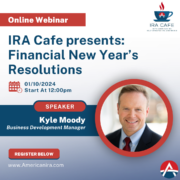Best Practices in Real Estate IRA Investing
 Generally, the best and smartest things you can do in Real Estate IRA investing are the same as the best and smartest things you can do outside of real estate investing. There are a few differences around the margins, because of the specific rules concerning prohibited transactions within Self-Directed IRAs (and other self-directed accounts, for that matter), and restrictions against using property for your own personal benefit. But broadly speaking, a good real estate investment is a good real estate investment, whether it’s inside or outside of a Self-Directed IRA.
Generally, the best and smartest things you can do in Real Estate IRA investing are the same as the best and smartest things you can do outside of real estate investing. There are a few differences around the margins, because of the specific rules concerning prohibited transactions within Self-Directed IRAs (and other self-directed accounts, for that matter), and restrictions against using property for your own personal benefit. But broadly speaking, a good real estate investment is a good real estate investment, whether it’s inside or outside of a Self-Directed IRA.
At American IRA, we have many clients who are very successful real estate investors with track records going back through several market cycles. All of them are vastly different people, but they all seem to have a few things in common.
A reputation for integrity. Word gets out about bad landlords. Today we have social media and websites devoted to apartment and landlord reviews. If you’re a bad landlord, or don’t deal fairly with your tenants, you will cause the value of your rental property to decline and you will have needlessly high vacancy rates.
Similarly, even if you are more of a flipper than a renter, the real estate investment community is fairly small – even in large cities. You will not get away with bad faith, unfair dealing, or shady behavior for long. The more people who respect and admire you, the more and better investment opportunities you will have, in the long run.
A businesslike approach. Our most successful real estate investing clients don’t treat their real estate practices like a hobby. They have professional-grade accounting systems in place. They establish entities. They retain professional help, and even put together informal “boards of advisors.” They keep a strict separation between their personal money and investment money and they have separate bank accounts. If it’s the majority of their income, it’s nearly a full-time job to many of them. They take similar care of properties in their Real Estate IRAs and self-directed solo 401(k)s and other retirement accounts. Even if they aren’t taking current income, they are very much running a currently viable investment “company” of sorts, within their IRA.
They focus on what they know. Most of our clients don’t run from property to property, making bids on and purchasing vastly different properties in very different neighborhoods. They aren’t going to buy a 5-acre farm in Iowa one day and then turn around and buy a Miami Beach condominium the next day. They focus specifically on what they know best. If you are comfortable with your grasp of valuations in a given neighborhood for 2 and 3 bedroom homes, then focus on that. This is what Warren Buffett calls a “circle of competence.” You can’t know everything well. If you try to do everything well, you will do nothing as well as you should. Focus on properties in the “sweet spot,” where you are the expert. Fewer mistakes = better long-term returns.
They get accounting help. For many people, real estate investing is very intuitive. Real estate taxation is not. There are many tax advantages to real estate investing, but simplicity of the tax code is not among them.
There are simply too many rules for the tax layman to stay abreast off all the time, and they are constantly changing. As a real estate investor, you’ll need to have a working knowledge of a lot of financial and taxation concepts. But that’s a far cry from actually filling out your returns. Invest in an experienced accountant.
Pro-tip: CPAs have a lot of pull with their clients. They are also very knowledgeable about the details of their client’s affairs. Because of this, they can be valuable sources of referrals for real estate investors.
They Don’t Work Alone. We mentioned the informal board of advisors many of them have with friends in key professions. That’s part of a broader trend – real estate is a people business, as much as a property business. The most successful are always nurturing their contacts in the community through networking, community service, and simply walking their neighborhoods, talking to property owners and looking for motivated sellers and motivated renters. Nurture your network. Include people from all walks of life, and build alliances. Send them referrals, generously. You will get your share.
They make money when they buy, not when they sell. Whether they are fast fix-n-flippers or long-term rental property owners, they all get good deals up front. They are always buying at surprisingly less than market value, because they find motivated sellers and they are good and wise negotiators. That way, they don’t rely on the weather, the “markets,” or things they can’t control, for future returns. They always seem to be finding properties for five to seven cents on the dollar, and either turning them around or renting them at or near full market value.
These people who keep up these good practices over a period of years inevitably do very well. Opportunities come to them, and they are careful to send opportunities to others as well.
If real estate is your ‘sweet spot,’ or you want to learn more about Real Estate IRA investing, please join us for an upcoming Web-based workshop and seminar on getting started in Self-Directed IRAs. If you’re already familiar with the basics of self-directed retirement accounts and want to focus on real estate, enroll in one of our workshops entitled “Growing Your Retirement Account with Real Estate”. Sign up for one of our free, no-obligation seminars here. Or call us at 866-7500-IRA (472)







